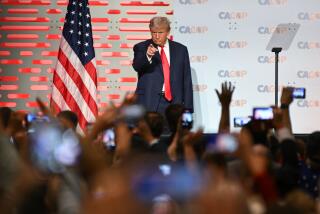Iowa GOP sets earliest date for voting
Iowa Republicans on Tuesday moved the date of their caucuses to Jan. 3, ensuring the earliest-ever start to the presidential primary season.
The caucuses -- a statewide gathering of party members who cast their votes in a series of precinct-level meetings -- were originally scheduled for Jan. 14. But the 2008 political calendar has been in flux for months, ever since Florida and other states began pushing their dates forward to have a greater say in the nominating process.
“We were going to have to move to stay first, so we just did it,” Chuck Laudner, executive director of the Iowa Republican Party, said after state GOP leaders approved the switch. “Moving into December was not an option, so we moved as close as we could without going over.”
Iowa Democrats have yet to schedule their vote. But the party is weighing two options: voting on the same day as the state GOP, or holding a separate vote on Jan. 5, which would split the caucuses for the first time since 1972.
“We will decide our caucus date based ultimately on what is best for the people of Iowa and the Democratic Party,” officials said in a statement issued shortly after Republicans announced their move.
Earlier Tuesday, Democrats in South Carolina announced they would seek the national party’s permission to advance their presidential primary to Jan. 26, three days ahead of the current schedule.
South Carolina Republicans are set to vote Jan. 19. Leaders of both parties are fighting to preserve South Carolina’s status as the nation’s first Southern primary.
The biggest remaining question is when New Hampshire will vote. The state will host the first primary and is expected to go no later than Jan. 8, though Secretary of State William M. Gardner -- who has sole discretion to set the date -- has said he may schedule the vote as early as December to protect New Hampshire’s primacy and spread the voting out.
Michigan has scheduled its primary for Jan. 15, in violation of national party rules. As a result, Democratic candidates have pledged to avoid campaigning in the state.
Whatever the final schedule, the result is the most front-loaded primary calendar since the current nominating system gained hold in 1972.
On Feb. 5 alone, more than a dozen states -- including California and New York -- will vote in what will amount to a coast-to-coast national primary.
More to Read
Get the L.A. Times Politics newsletter
Deeply reported insights into legislation, politics and policy from Sacramento, Washington and beyond. In your inbox three times per week.
You may occasionally receive promotional content from the Los Angeles Times.











